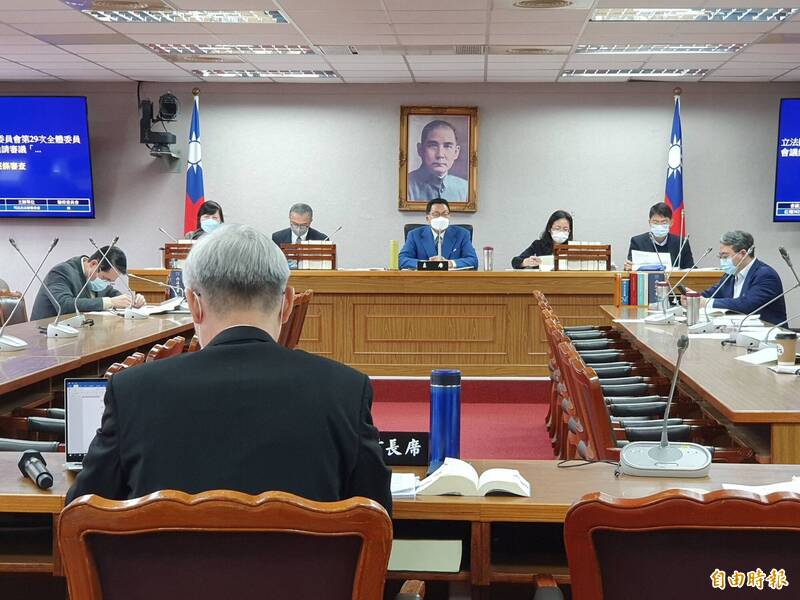The Judiciary and Legal Affairs Committee of the Legislative Yuan passed the "Draft Amendment to Some Articles of the Constitutional Procedure Law" for the first time today.
(Photo by reporter Xie Junlin)
[Reporter Xie Junlin/Taipei Report] The Judiciary and Legal Affairs Committee of the Legislative Yuan passed the "Draft Amendment to Some Articles of the Constitutional Procedure Law" for the first time. If the execution or execution has not been completed, it shall not be executed again within the scope of unconstitutionality.” But the new version of the draft deletes it, “If it is changed today, and the violation of the law has been declared unconstitutional, then half of the people will continue to be detained? "
The Judicial Yuan’s proposal pointed out that in order to ensure the third party’s participation in the constitutional proceedings, adjust the normative system of the Constitutional Court Judgment Law to regulate the immediate invalidation of constitutional violations and retrospective invalidation, optimize the application and trial procedures, and promote the effectiveness of trials, so the amendments are proposed In the draft, a total of 15 articles were amended and 1 article was added.
Please read on...
The Judicial Committee of the Legislative Yuan scheduled a review of the Constitutional Procedure Law on October 19 this year, and held a public hearing on November 3. Among them, some legislators, experts and scholars questioned that the provisions proposed by the Judicial Yuan are only for the convenience of review, and they are not yet available. It is not good to drastically change and amend the law without clarifying the direction. The Judiciary should think twice and accept opinions widely.
In view of this, the Judiciary Yuan proposed an amendment motion on its own during the review by the committee today, and a total of 10 articles were not amended.
The more discussion on today's agenda is the division of normative effect of "immediate invalidation" or "retroactive invalidation" in the Constitutional Court Judgment Declaration Law.
Lin Huihuang, secretary-general of the Judicial Yuan, said frankly that Zhou Yan was not considered in the original legislation. Under the special background of our country, the retroactive effect of the judgment of unconstitutionality that immediately expires has a considerable impact.
Lin Huihuang cites "adultery" as an example, pointing out that in December 2002, the Interpretation No. 554 of the Supreme Court held that the crime of adultery was constitutional, and nearly 18 years later, in Interpretation No. The crime of adultery is unconstitutional, and the number of cases involved is quite large (16,113). If it is declared unconstitutional by the Constitutional Court, it will immediately become invalid, and the case can be overturned according to the current provisions. The above-mentioned cases may flood the courts and occupy precious judicial resources.
Lin Huihuang said that the thinking of legal justice in each era is different, and this part must be considered before adjusting the content of the provisions and dividing the normative effect of "immediate lapse" and "retroactive lapse".
However, Democratic Progressive Party Legislator Jiang Yongchang pointed out that the current provisions aim at the unconstitutionality of the Judgment Announcement Act, clearly stipulating that "those that have not yet been implemented or the implementation has not been completed shall not be enforced within the scope of unconstitutionality." However, the new version of the draft deletes it, " If it is changed today and the law violated has been declared unconstitutional, then half of the people will continue to be locked up?"
Lin Huihuang said that there should be no problems. Article 2, Item 3 of the Criminal Law stipulates otherwise, "After the judgment of punishment or security measures is confirmed, if the judgment is not executed or the execution is not completed, and the law changes, the behavior or Those who do not impose security measures shall be exempted from punishment or carry out security measures.”
In addition, Lin Huihuang further pointed out that if all the constitutional judgments that are immediately invalidated are blocked in the future, sometimes it will be excessive. The judgment created a dilemma where the case was clearly won, but the rights could not be realized, and a new judgment could not be retried.
DPP Legislator Huang Shijie mentioned that whether certain judgments should continue to be enforced after being declared unconstitutional involves different fields of law, and it is difficult to generalize, especially who will judge within the scope of unconstitutionality?
Jiang Yongchang also questioned that there are not only criminal cases, but also subsidiary civil cases and administrative penalties; the judicial court cited German laws and regulations, but there is no relief system; and "You use unconstitutional civil laws, and I will continue to implement them? This is very strange." In addition, he also believes that the scope of unconstitutionality should be determined by the justices, and the provisions should also specify their responsibilities.
Since the two parties could not reach a consensus, the relevant provisions were reserved for negotiation.
